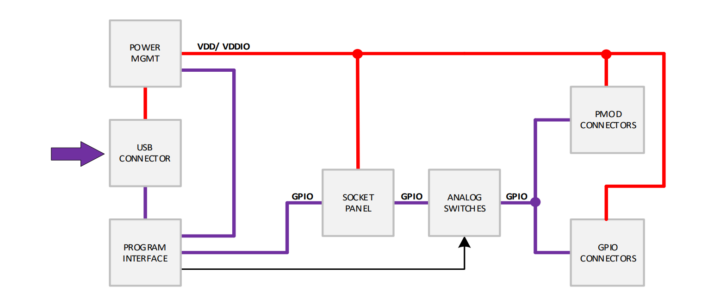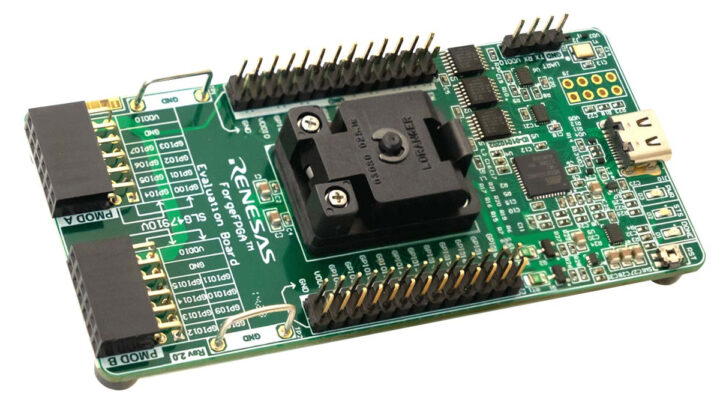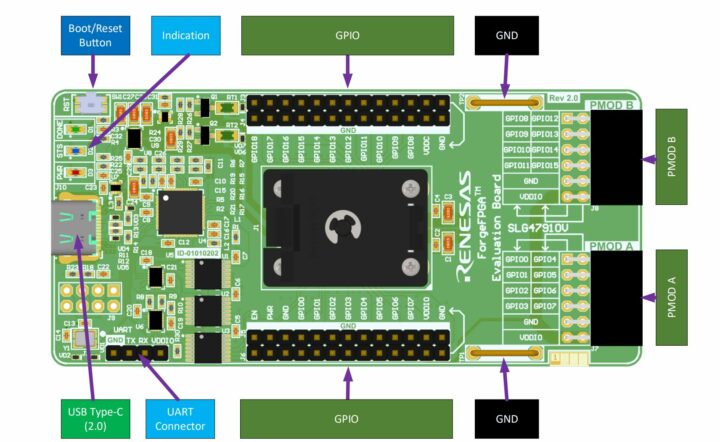Renesas SLG7EVBFORGE FPGA dev board, built around SLG47910V is Renesas’ first low-density FPGA in the ForgeFPGA family. The FPGA includes 1120 LUTs, 1120 flip-flops, 5kb of distributed memory, 32kb of block RAM, and a 50 MHz on-chip oscillator with a phase-locked loop (PLL). With robust features, low power consumption, and affordable pricing this FPGA can be used in applications in sensor data aggregation, consumer electronics, and portable computing devices.
The SLG47910V FPGA gets connected to a ZIF socket to the development board, this design choice puts out a clear sign that upcoming Forge family FPGAs will support this dev board. Additionally, it features Pmod connectors and configurable power sources. The dev board can be programmed via OTP Non-Volatile Memory or SPI interface and additional features get managed through Renesas’ Go Configure Software Hub.
Previously we have written about similar low-power low-cost FPGA boards like the Sipeed Tang Mega 138K, the Avnet ZUBoard 1CG, and the Avnet ZUBoard 1CG feel free to check those out if you are looking for low-power FPGAs.
Renesas SLG7EVBFORGE FPGA dev board specifications
- ForgeFPGA SLG47910
- 1120 5-bit LUTs
- 1120 DFFs
- 5 kb distributed memory
- 32 kb BRAM
- Configurable through NVM and/or SPI interface
- Clock – 50 MHz On-chip Oscillator with PLL that can generate up to 2000MHz
- Phase-locked Loop (PLL) – Input from external source or internal oscillators;
- Additional Features
- 19 GPIO pins
- Configurable VDD and VDDIO Power Sources
- Zero-Force 24-pin Socket
- Emulation and programming options
- Two PMOD connectors for external connections
- Three onboard LEDs for power, status, and configuration
- Hardware reset and boot sequence via reset button
- Security – Bitstream Security Features with OTP Configuration only
- Power Supply
- VDDIO: 1.71 V to 3.6 V;
- VDDCore: 1.1 V ± 10%;
- Power-On-Reset (POR)
- Operating Temperature Range: -40 °C to +85 °C
The board is powered and programmed through USB and it can also do design emulation and real-time testing through a USB-C. The board also features configurable VDD and VDDIO power sources, meaning you can add to whatever peripherals you need and configure the supply accordingly.
Speaking of peripherals, the board features not one but two Pmod connectors to which additional peripherals can be connected. Additionally, the dev board features a Zero Insertion Force socket meaning you can swap the chip very easily if it gets damaged while development, on top of that this design choice makes it simple to use future FPGA chips with this board.
This dev board works with Renesas’ Go Configure Software Hub, allowing for emulation, IC programming, and UART terminal use. It can be programmed via OTP memory or SPI interface for secure and adaptable FPGA configuration.

In terms of documentation, the company provides a user manual, configuration guide, software simulation guide, and a quick start guide all of which can be found on the product page, where you’ll find the Go Configure Software Hub to access development tools, some of which rely on the Yosys open synthesis suite.
The Renesas SLG7EVBFORGE FPGA dev board is priced at around $177.18 and can be purchased from Mouser and DigiKey. The price of ForgeFPGA-based boards may eventually come down since we were told “ForgeFPGA family of low-cost low-power FPGA’s to go for under 50 cents in (large) volumes” when the FPGA family was unveiled in 2021.
Debashis Das is a technical content writer and embedded engineer with over five years of experience in the industry. With expertise in Embedded C, PCB Design, and SEO optimization, he effectively blends difficult technical topics with clear communication
Support CNX Software! Donate via cryptocurrencies, become a Patron on Patreon, or purchase goods on Amazon or Aliexpress






